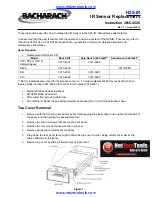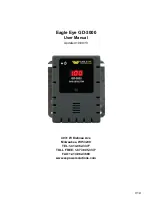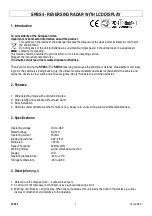
Technical Details
18
Interpreting Alerts
Although the STi has a comprehensive
warning system and this handbook is as
complete as we can make it, only
experience will teach you what to expect
from your STi and how to interpret what it
tells you. The specific type of radar being
used, the type of transmission (continuous
or instant-on) and the location of the radar
source affect the radar alerts you receive.
The following examples will give you
an introduction to understanding the STi’s
warning system for radar, laser and safety
alerts.
Explanation
You are approaching a continuous radar
source aimed in your direction.
An instant-on radar source is being used ahead
of you and out of your view.
An instant-on radar source or laser source is
being used nearby. This kind of alert requires
immediate attention!
Laser is being used in the area. Because laser is
inherently difficult to detect, any laser alert
may indicate a source very close by.
A moving patrol car with continuous radar is
overtaking you from behind. Because these
signals are reflected (reflections are increased
by large objects), they may or may not
eventually melt into a solid point even when
the patrol car is directly behind you.
Alert
The STi begins to sound slowly, then the rate
of alert increases. The Signal Meter ramps
accordingly.
STi emits short alerts for a few seconds and
then falls silent only to briefly alert and fall
silent again.
STi suddenly sounds a continuous tone for the
appropriate band received. All segments in the
Signal Strength Meter are lit.
A brief laser alert.
STi receives weak signals. These signals may
be a little stronger as you pass large, roadside
objects. The signals increase in frequency.
19
Explanation
You are approaching a radar unit concealed by
a hill or an obstructed curve.
A patrol car is traveling in front of you with a
radar source aimed forward. Because signals
are sometimes reflected off of large objects
and sometimes not, the alerts may seem
inconsistent.
A patrol car is approaching from the other
direction, sampling traffic with instant-on
radar. Such alerts should be taken seriously.
You are driving through an area populated
with radar motion sensors (door openers,
burglar alarms, etc.). Since these transmitters
are usually contained inside buildings or aimed
toward OR away from you, they are typically
not as strong or lasting as a real radar
encounter.
Alert
STi alerts slowly for a while and then abruptly
jumps to a strong alert.
STi alerts intermittently. Rate and strength of
alerts may be consistent or vary wildly.
STi alerts intermittently. Rate and strength of
signal increases with each alert.
STi gives an X-band alert intermittently.
CAUTION:
Since the characteristics of these
alerts may be similar to some of the
preceding examples, overconfidence in an
unfamiliar area can be dangerous.
Likewise, if an alert in a commonly
traveled area is suddenly stronger or on a
different band than usual, speed radar may
be set up nearby.
STi Manual 3/28/05 3:39 PM Page 21


































